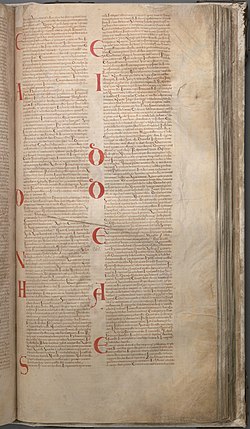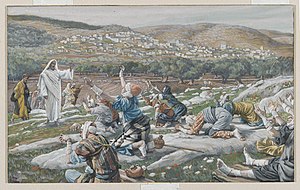Luke 17
| Luke 17 | |
|---|---|
 The Latin text of Luke 14:30–19:7 in Codex Gigas (13th century). | |
| Book | Gospel of Luke |
| Category | Gospel |
| Christian Bible part | New Testament |
| Order in the Christian part | 3 |
Luke 17 is the seventeenth chapter of the Gospel of Luke in the New Testament of the Christian Bible. It records "some sayings of Jesus"[1] and the healing of ten lepers.[2] The book containing this chapter is anonymous, but early Christian tradition uniformly affirmed that Luke the Evangelist composed this Gospel as well as the Acts of the Apostles.[3]
Text
The original text was written in Koine Greek. Some early manuscripts containing the text of this chapter are:
- Papyrus 75 (175–225)
- Papyrus 111 (3rd-century)
- Codex Vaticanus (325–350)
- Codex Sinaiticus (330–360)
- Codex Bezae (~400)
- Codex Washingtonianus (~400)
- Codex Alexandrinus (400–440).
This chapter is divided into 37 verses. The New King James Version divides it into four sections, headed respectively "Jesus Warns of Offences" (verses 1–4), "Faith and Duty" (verses 5–10), "Ten Lepers Cleansed" (verses 11–19) and "The Coming of the Kingdom" (verses 20–37).[4]
Offences and forgiving of offences (17:1–10)
Verses 1–10 are presented as a single unit in the New International Version. Commenting on the variety of topics covered in the first ten verses, Lutheran biblical writer Harold Buls states that he "assumes that there is logical sequence. The items are not merely picked or chosen by Luke from some outside source".[5]
Verse 1
- Then He [Jesus] said to the disciples, "It is impossible that no offenses should come, but woe to him through whom they do come!"[6]
Jesus warns of "offences" coming, literally "
Verse 2
- It would be better for him if a millstone were hung around his neck, and he were thrown into the sea, than that he should offend one of these little ones.[10]
The "little ones" are the more vulnerable members of the community of disciples.
Verses 3b–4
- If your brother sins against you, rebuke him; and if he repents, forgive him. And if he sins against you seven times in a day, and seven times in a day returns to you, saying, 'I repent', you shall forgive him.[13]
The Jerusalem Bible suggests that "Luke, apparently, is thinking of a matter that concerns only two of the community". Matthew 18 refers to a process of appealing to the community, which is missing from Luke's writing on this subject.[14]
Verse 5
- And the apostles said to the Lord, "Increase our faith".[15]
Having previously addressed "the disciples" (Luke 16:1 and 17:1), Jesus speaks now to the apostles, who come to him "with a special request". They feel that the moral strength of their faith in Jesus, i.e. just the loving power of their faith, is not great enough for that great task of forgiveness" which has just set for them in the previous verse:[16] Their request is for "stronger energetic faith", better in quality rather than quantitatively more.[16]
Verses 7-10
Jesus describes a master who expects
Cleansing ten lepers (17:11–19)

This is one of the
This miracle has been described as emphasising the importance of faith, for Jesus did not say: "My power has saved you" but attributed the healing to the faith of the beneficiaries.[20][21]
The coming of the kingdom (17:20–21)
Verse 20
- Now when He was asked by the kingdom of God would come, He answered them and said, "The kingdom of God does not come with observation";[22]
Verse 21
- Neither shall they say, Lo here! or, lo there! for, behold, the kingdom of God is within you.[23]
The day of the Son of Man (17:22–37)
The discourse in Luke 17:22–37 is proper to this gospel. Luke handles the "end of time" in a different manner from
See also
- Leper
- Lot
- Ministry of Jesus
- Miracles of Jesus
- Noah
- Samaritan
- The Kingdom of God is Within You
- Other related Leviticus 14, 2 Kings 5, Matthew 24
References
- ^ Sub-heading at Luke 17:1 in the New Revised Standard Version
- ^ Halley, Henry Hampton (1965). Halley's Bible handbook: an Abbreviated Bible commentary (24th ed.). Grand Rapids: Zondervan. p. 516.
- ISBN 978-0-8054-9930-8.
- ^ Luke 17
- ^ Buls, H. H., Luke 17:1–10, accessed 21 January 2022
- ^ Luke 17:1: NKJV
- ^ Luke 17:1: Textus Receptus
- ^ Luke 13:33: New Revised Standard Version
- ^ Bengel, J. A., Bengel's Gnomon of the New Testament on Luke 17, accessed 5 August 2020
- ^ Luke 17:2: NKJV
- ^ Franklin, E., 58. Luke in Barton, J. and Muddiman, J. (2001), The Oxford Bible Commentary, p. 949
- BibleGateway.com, Keyword Search: "little ones", accessed 22 January 2022
- ^ Luke 17:3–4: NKJV
- ^ Jerusalem Bible (1966), footnote a at Luke 17
- ^ Luke 17:5: NKJV
- ^ a b Meyer, H. A. W., Meyer's NT Commentary on Luke 17, translated from the German sixth edition, accessed 29 June 2018
- ^ Minear, P., A Note on Luke 17:7-10, Journal of Biblical Literature , March 1974, Vol. 93, No. 1, pp. 82-87, accessed 4 October 2023
- ISBN 978-0-7814-3868-1.
- NIV
- ISBN 978-0-89622-537-4.
- ISBN 978-0-310-28101-6.
- ^ Luke 17:20 NKJV
- ^ Luke 17:21: KJV
- ^ Haydock, G. L. (1859), Haydock's Catholic Bible Commentary on Lke 17, accessed 5 October 2023
- ^ Luke 17:20: ISV
- ^ Englishman's Concordance, παρατηρήσεως
- ^ Gill, J. (1746-63), Gill's Exposition of the Entire Bible on Luke 17, accessed 5 October 2023
- ^ Jerusalem Bible (1966), footnote d at Luke 17:21
- ^ Jerusalem Bible (1966), footnote e at Luke 17:22
External links
- Luke 17 King James Bible – Wikisource
- English Translation with Parallel Latin Vulgate
- Online Bible at GospelHall.org (ESV, KJV, Darby, American Standard Version, Bible in Basic English)
- Multiple bible versions at Bible Gateway (NKJV, NIV, NRSV etc.)
| Preceded by Luke 16 |
Chapters of the Bible Gospel of Luke |
Succeeded by Luke 18 |
